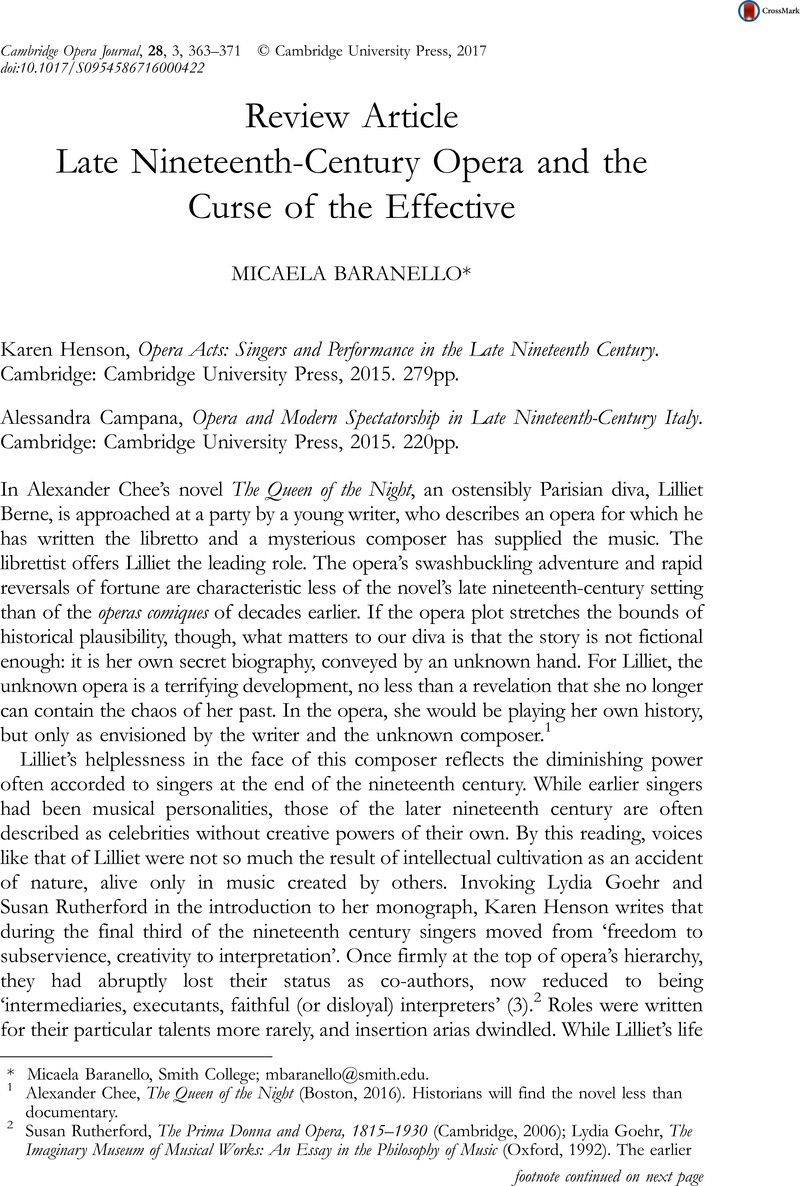No CrossRef data available.
Published online by Cambridge University Press: 20 March 2017

Micaela Baranello, Smith College; [email protected].
1 Chee, Alexander, The Queen of the Night (Boston, 2016)Google Scholar. Historians will find the novel less than documentary.
2 Rutherford, Susan, The Prima Donna and Opera, 1815–1930 (Cambridge, 2006)Google Scholar; Goehr, Lydia, The Imaginary Museum of Musical Works: An Essay in the Philosophy of Music (Oxford, 1992)Google Scholar. The earlier era to which Henson alludes is considered in Hilary Poriss, Changing the Score: Arias, Prima Donnas, and the Authority of Performance (Oxford, 2009).
3 For a summary of this discourse, see Levine, Lawrence W., Highbrow/Lowbrow: The Emergence of Cultural Hierarchy in America (Cambridge, MA, 1988), 254 Google Scholar.
4 This is addressed in Lockhart, Ellen, ‘Photo-Opera: La fanciulla del West and the Staging Souvenir’, Cambridge Opera Journal 23 (2011), 145CrossRefGoogle Scholar.
5 Joseph Kerman’s notorious dismissal of Puccini in Opera as Drama (New York, 1956) cast a long shadow; in 2016 Leon Botstein could still describe Puccini as relying on the ‘temporarily affecting experience of theatrical spectacle’, which is ‘too pat, too self-consciously beautiful, and too easy to listen to’. Botstein, ‘Music, Language, and Meaning in Opera: Puccini and His Contemporaries’, in Puccini and His World, ed. Arman Schwartz and Emanuele Senici (Princeton, 2016), 216.
6 While occasionally discussed before now, the staging manual has figured in interpretative studies such as this one comparatively rarely. Exceptions include Lockhart, ‘Photo-Opera’; Senici, Emanuele, Landscape and Gender in Italian Opera: The Alpine Virgin from Bellini to Puccini (Cambridge, 2005)Google Scholar; and Schwartz, Arman, ‘Manon in the Desert, Wagner on the Beach’, Opera Quarterly 24 (2008), 51 CrossRefGoogle Scholar.
7 Abbate, Carolyn, Unsung Voices: Opera and Musical Narrative in the Nineteenth Century (Princeton, 1996), 64 Google Scholar.
8 Material and technological concerns have often predominated in studies of opera staging history; see, for example, Baker, Evan, From the Score to the Stage: An Illustrated History of Continental Opera Production and Staging (Chicago, 2013)Google Scholar. For much more on the practical implications of staging manuals, see Alison Latham and Roger Parker, eds., Verdi in Performance (Oxford, 2001).
9 The most widely accessible of the staging manuals under discussion here is that of Otello: James A. Hepokoski and Mercedes Viale Ferrero, eds., Otello di Giuseppe Verdi (Milan, 1990).
10 Many of these make cameo appearances in Chee’s The Queen of the Night; Lilliet even studies with Viardot.
11 Despite the ‘supporting’ label, this section includes some prominent names, including Emma Calvé and Victor Capoul.
12 Richard Dyer, Stars, rev. edn (London, 1998).
13 Tamagno recorded this section a total of three times. The recording discussed here is available on the CD collection ‘Otello e Jago: Incisioni storiche dal 1902 al 1951’, Casa della Musica/Warner Classics 8034063960096.
14 Sarah Fuchs Sampson, ‘Technologies of Singing, Teaching, and Spectating in French Operatic Culture, 1870–1914’, PhD diss., University of Rochester, Eastman School of Music (2016), 59–63.
15 Wilson, Alexandra, The Puccini Problem: Opera, Nationalism and Modernity (Cambridge, 2007)CrossRefGoogle Scholar. Other recent work on this era includes Susan Rutherford, Verdi, Opera, Women (Cambridge, 2014); Leppert, Richard, Aesthetic Technologies of Modernity, Subjectivity, and Nature: Opera, Orchestra, Phonograph, Film (Berkeley, 2015)Google Scholar; Arman Schwartz, Puccini’s Soundscapes: Realism and Modernity in Italian Opera (Florence, 2016).
16 A polemical discussion of this subject can be found in David Levin, Unsettling Opera: Staging Mozart, Verdi, Wagner, and Zemlinsky (Chicago, 2007). I address the implications of this for issues of gender in particular in ‘When Cries of Rape are Heard in Opera Halls’, New York Times (16 July 2015), www.nytimes.com/2015/07/19/arts/music/when-cries-of-rape-are-heard-in-opera-halls.html.